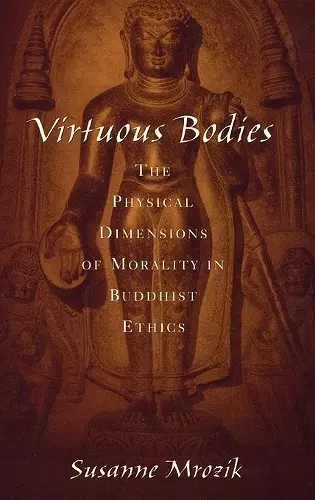Virtuous Bodies
The Physical Dimensions of Morality in Buddhist Ethics
Format:Hardback
Publisher:Oxford University Press Inc
Published:26th Jul '07
Currently unavailable, and unfortunately no date known when it will be back

This work examines the role of bodies in Buddhist ethics, highlighting their significance in moral development and transformation, particularly through the lens of bodhisattvas and their impact on others.
Virtuous Bodies delves into the intricate relationship between the physical form and ethical development within Buddhist ethics. Traditionally, there has been a strong link between one's body and moral standing in Buddhist thought, where descriptions of beings often reflect their ethical state—be it through sin, vice, or virtue. Susanne Mrozik centers her analysis on an influential early medieval Indian Mahāyāna text, Śāntideva's Compendium of Training (Śikṣāsamuccaya), to illustrate how Buddhists perceived ethical growth as a transformative journey involving both physical and moral dimensions.
Mrozik's choice of Compendium of Training is particularly significant due to its extensive references to over one hundred Buddhist scriptures, which allows for a broader exploration of the ethical implications of the body in Buddhist practice. This text serves as a guide for bodhisattvas, particularly those in monastic life, highlighting how bodies can act as indicators and facilitators of ethical progress. Notably, the book emphasizes that virtuous bodies not only reflect individual ethical development but also play a crucial role in uplifting others. When individuals encounter the virtuous forms of bodhisattvas, they experience both physical and moral enhancement.
Through Virtuous Bodies, Mrozik engages with thought-provoking questions about the nature of virtue and its embodiment. She examines what constitutes a virtuous body and the impact such bodies have on others. By incorporating contemporary theoretical perspectives and employing a feminist lens, the book offers valuable insights into the ethical resources within Buddhism, making it a significant contribution for both scholars and practitioners interested in the embodied aspects of ethical ideals.
Susanne Mrozik's Virtuous Bodies makes a valuable contribution by demonstrating, in a clear and compelling way, how morality is associated with the body in ancient Indian Buddhism. We learn that physical bodies, far from being just loathsome and defiling things, were sometimes viewed as beautiful and capable of aiding others in the pursuit of liberation. As such, Mrozik's work represents an exemplary study whereby a single text-Santideva's Compendium of Training?in tandem with insights from feminist and critical theory can be used to illuminate an important, and often overlooked, facet of early Buddhist thought. * Stephen C. Berkwitz, author of Buddhist History in the Vernacular: The Power of the Past in Late Medieval Sri Lanka *
Using Santideva's Compendium of Training as its point of focus, Mrozik's study redresses a major imbalance in modern discussions of Buddhist ethics, which have tended to emphasize the importance of the affective and cognitive dimensions of the moral development of the bodhisattva. Virtuous Bodies convincingly demonstrates that Buddhist moral discourse emphasizes the cultivation of physical qualities as much as it does psychological qualities. By clarifying the importance of the morally transformative power of Buddhas' and bodhisattvas' bodies in Mahayana literature, Mrozik offers a new way of conceptualizing the negative Buddhist discourse that devalues bodies as impermanent, foul, and lacking in intrinsic value. * Peter N. Gregory, Jill Ker Conway Professor of Religion & East Asian Studies, Smith College *
Virtuous Bodies is a masterful interdisciplinary work. Mrozik's innovative approach breaks down disciplinary boundaries between ethics, gender studies, history of religions, and critical theory. * Liz Wilson, Professor and Chair, Department of Comparative Religion, Miami University *
ISBN: 9780195305005
Dimensions: 157mm x 234mm x 23mm
Weight: 468g
200 pages